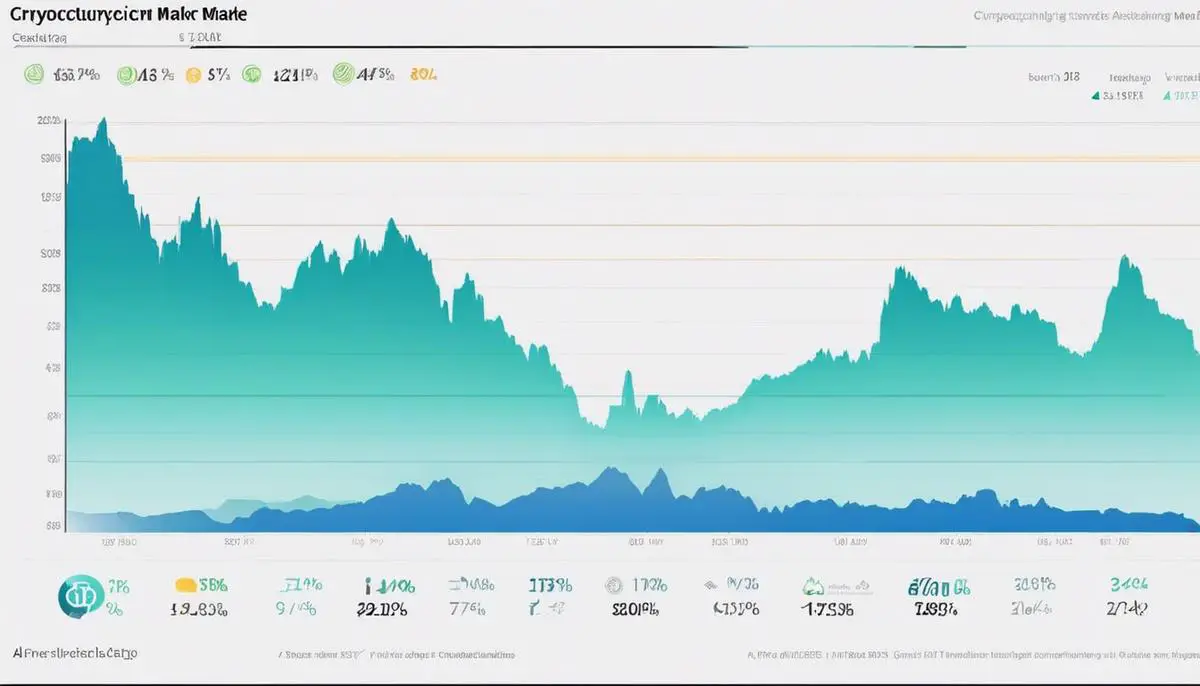As digital currencies continue to reshape fiscal landscapes worldwide, the need for comprehensive understanding and strategic engagement with the cryptocurrency market is ever more significant. From decentralization to blockchain technology, these virtual currencies present untold opportunities and growth potentials wrapped in complexities and regulatory concerns. This discourse aims at elucidating various vital aspects surrounding cryptocurrency; from the nature of the market, relevant opportunities to regulatory compliance and the impact on the global economy to market analysis and trading strategies. Essential for the general public, entrepreneurs, and innovators, this assessment serves as an engaging entry point into the crypto-market landscape.
The Nature of Cryptocurrency Market
Cryptocurrency: Bridging the Gap Between Mystery and Understanding
Cryptocurrency – without a doubt, a word that resonates in the corridors of innovation and disrupts financial landscapes unlike anything before. Undoubtedly puzzling yet tantalizing, with tales of overnight billionaires and businesses revolutionized. Yet, what exactly is the cryptocurrency market and how does it operate?
At its core, a cryptocurrency is a type of digital or virtual currency secured by cryptography, making it near impossible to counterfeit or double-spend. Mind you, it’s not just about Bitcoin anymore. Cryptocurrencies are a broad spectrum that range from the renowned Bitcoin, to altcoins like Ethereum and Ripple, and even tokenized assets. This diverse field of digital currencies is what we refer to as the cryptocurrency market.
The key principle here is decentralization. Traditional banking systems are a centralized model, with transactions taking place through a single central point. On the other hand, cryptocurrencies use decentralized technology – a shared ledger called blockchain allows the recording of transactions and tracking of assets across numerous computers – eliminating the sole dependence on banks to transfer funds.
The cryptocurrency market operates in a way that is, for the most part, uncharted territory. Equal parts exciting and daunting, unlike physical markets, the cryptocurrency market operates 24/7. This around-the-clock availability is due to the absence of central regulatory authority and the global nature of the cryptocurrency market.
Trading of cryptocurrencies takes place on various platforms known as cryptocurrency exchanges. Here, buyers and sellers connect, buying cryptocurrencies using ‘traditional’ money or trading them for goods or services. While exchanges keep the market flowing, they also underline the potential risk of security breaches. Hence, smart and cautious trading is essential in this fast-paced market.
Understanding the price fluctuations in the cryptocurrency market is a phenomenon in itself. Influenced by a myriad of factors such as supply and demand, the rate of coin production, and macroeconomic announcements – patronizing it as volatile would be an understatement.
However, this volatility also serves as the market’s most enticing factor, drawing risk-takers and innovators from various industries to its throbbing pulse. Tech-savvy entrepreneurs, venture capitalists, traders, and even large corporations are attracted to this market’s potential.
The inroads cryptocurrencies have made into various sectors are applaudable. From finance and real estate to healthcare and entertainment, businesses are ardently exploring ways to leverage digital currencies for quicker, cheaper transactions and a global consumer reach.
To put it simply, the potential in the cryptocurrency market is copious, and it’s just getting warmed up. Yes, it is uncertain and risky, but aren’t all things path-breaking? The market is teeming with opportunities for those who dare to understand and harness their power. Continuously evolving and open for innovation, the cryptocurrency market is a realm in its own, thriving on the heartbeat of the future.

Why Businesses Should Invest in Cryptocurrency
Cryptocurrency: Unleashing A New Era Of Value Exchange In Modern Businesses
The advent of cryptocurrency represents the beginning of a new era in finance. However, its relevance moves far beyond individual monetary gain – it’s unlocking numerous strategic advantages for modern businesses across the gamut. Recognizing these opportunities is a fundamental step towards financial success in our increasingly digitized economy.
Firstly, cryptocurrencies provide an efficient medium of exchange. Utilizing digital currencies slashes the time and cost of traditional cross-border transactions. No need to wait for bank holidays or endure lengthy processes – cryptocurrencies inspire smooth, quick trade. For businesses with an international footprint, this advantage cannot be understated.
Similarly, the rapid growth of peer-to-peer transactions, underscored by cryptocurrencies, significantly lowers transaction costs. Removing intermediaries delivers direct cost-saving implications for businesses. Moreover, cryptocurrencies aid in creating a more seamless user experience, making transactions frictionless and reducing barriers to customer purchasing.
Next, let’s consider security. With encryption at their core, cryptocurrencies offer unprecedented levels of security. This feature, combined with the transparency inherent in blockchain technology, makes it increasingly challenging for fraudulent activities to occur undetected. Businesses using cryptocurrencies can, therefore, offer their customers an extra layer of protection, increasing trust, loyalty, and ultimately, profit.
Leveraging cryptocurrencies also opens up untapped markets. Traditionally, 1.7 billion people globally remain unbanked, denied access to most financial services. However, with an internet connection and a digital wallet, these potential customers can access the goods and services offered by businesses operating in the cryptocurrency space. This leads to a significant increase in customer base and revenue potential.
Finally, organizations with a keen eye on future-proofing their business strategies are exploring cryptocurrencies’ ability to foster business innovation. In particular, the use of programmable smart contracts on some cryptocurrencies permits companies to automate processes, harbor transparency, increase speed, and minimize human errors.
In sum, the smart utilization of cryptocurrencies can unlock a plethora of strategic benefits for businesses. It has the potential to streamline transactions, slash costs, enhance security, engage untapped markets, and drive radical innovation. As we traverse the paradigm shift towards a digitized economy, such advantages will be the defining factors for businesses that stand the test of time.
No other financial technology has ever held such immense implications for business operation across the globe. Welcome to the future of finance – embrace it.

Cryptocurrency Regulations and Compliance
Tackling Regulatory Hurdles in the Crypto Market
In the fast-paced world of cryptocurrencies, successful navigation necessitates an understanding of the regulatory landscape. A range of jurisdictions worldwide is grappling with crafting considerations that would rein in the unruly crypto market, and their significant variations present distinct challenges and opportunities.
While regulatory measures are intended to protect investors and maintain market integrity, they add to the complexity of the crypto-market environment. Cryptocurrency regulations vary from country to country, spanning from outright bans to encouraging innovations. For instance, China has taken a hard line against cryptocurrencies, whereas Switzerland is positioning itself as a crypto-friendly environment. Navigating such a divide is one of the crucial challenges facing businesses and entrepreneurs delving into the crypto space.
Moreover, regulatory scrutiny is a paramount consideration in Initial Coin Offerings (ICOs). Governments worldwide are waking up to the reality of ICOs as a new method of fundraising and are setting out to regiment them accordingly. ICOs may be classified as securities, making them subject to strict regulations in countries like the U.S, where the Securities and Exchange Commission (SEC) is very much involved.
Managing compliance with these intricate and evolving regulations is a formidable task. A blend of technology, expert advice, and proactive strategy becomes imperative. Proponents of cryptocurrencies must leverage legal expertise to understand the implications of regulations and how they apply to their specific business model. Engaging with regulatory bodies and legal experts not only mitigates risk but also helps maintain credibility among users.
Technological solutions also play a role in ensuring compliance. By employing regulatory technology, companies can identify and mitigate potential risks before they become full-blown issues. Crypto-friendly jurisdictions also offer ‘regulatory sandboxes’: a controlled environment for businesses to test innovative products, services, and business models without the fear of stringent regulations, which could help organizations inch towards regulatory compliance.
However, these strategies are not standalone solutions. Businesses must adopt an integrated approach to manage regulatory risks, utilizing technological solutions and professional advisories while engaging in fruitful discussions with regulators. Constant vigilance and adaptability can ensure the longevity and success of a cryptocurrency venture within the complex regulatory landscape.
As stated by Andreas Antonopoulos, the globally-recognized Bitcoin expert, “First, they ignore you. Then, they laugh at you. Then, they fight you. Then, you win.” It is interesting to think that cryptocurrencies and the regulations surrounding them are stuck somewhere between ‘they fight you’ and ‘then you win’. The crypto market is indeed at a crucial period forgiving shape to tomorrow’s financial markets. Effectively navigating the current regulatory landscape requires preparedness, strategic partnerships, and a keen acknowledgment of the broader financial landscape where cryptocurrencies operate. Let’s spearhead the revolution thoughtfully and responsibly, transforming challenges into opportunities for innovation and success.

Impacts of Cryptocurrency on the Global Economy
As cryptocurrencies continue elevating, they’re causing profound impacts on global markets and economies. Beyond standard transactions and innovations, their rise is revolutionizing the ways in which economies function. Keep reading to understand how.
Cryptocurrencies have introduced entirely new possibilities for raising capital via Initial Coin Offerings (ICOs). These digital token sales represent a fundamental shift away from traditional, institutionalized financing methods. While venture capitalism and initial public offerings have dominated, ICOs allow companies to raise funds directly from individual investors worldwide. But this turbulent capital landscape ushers in challenges as well. It’s essential for companies to understand and adhere to complex regulatory requirements associated with ICOs, varying significantly from one jurisdiction to another.
Their global nature also challenges traditional economic models by decreasing dependency on national currencies. As decentralized mediums of exchange, cryptocurrencies are less susceptible to factors like inflation, monetary policy changes, and tariff impositions that influence fiat currencies. This might reshape global economic dynamics by inducing new e-commerce frontiers insulated from conventional geopolitical and macroeconomic factors.
Cryptocurrencies act as a significant equalizer in the world economy, providing financial inclusivity. For those in developing nations with inadequate access to traditional banking, cryptocurrencies appear as a viable solution. This leads to inclusion of an untapped market segment, triggering significant economic growth globally.
Economic effects don’t stop at inclusion and capital raising. A significant shift is also noticeable in investment diversification. Unlike traditional assets, cryptocurrencies’ volatility offers a new avenue for investors seeking high risk-reward ratios. This has prompted the creation of crypto-asset funds, further embedding cryptocurrencies into the global economic system.
In terms of economic sectors, the effects vary. The proliferation of cryptocurrencies fosters competition within the banking sphere, forcing traditional institutions to innovate. It’s also disrupting the remittances market, providing cheaper and faster cross-border transactions.
Envisioning the future, the integration of cryptocurrencies within economies holds transformative potential. The adoption of smart contracts could revolutionize the way legal bonds and business contracts operate, enhancing efficiency and minimizing human error.
Still, the cryptoworld isn’t without potential downfall. Regulatory uncertainty and associated compliance issues can hinder adoption rates. Cryptocurrencies’ potential misuse in illegal activities is an ongoing concern. Their volatility can also render them unreliable as storage of value.
Yet, these concerns haven’t stopped the market’s evolution. The rise of cryptocurrencies has a significant, undeniable economic pulse. While the full spectrum of impacts isn’t wholly understood yet, one fact is clear—the ascendance of this nascent landscape is set to profoundly shape world economies.
With continued developments, a future where cryptocurrencies coexist with traditional forms of money seems plausible. The key lies in successfully navigating impending challenges, leveraging emerging opportunities, and in regulators devising frameworks that balance both empowerment and protection. The rise of cryptocurrencies signifies more than a trend; it may well symbolize a new economic era. Understanding its potential, risks, and nuances marks the first step in this revolution.

Cryptocurrency Trade and Market Analysis
The age of digital gold, the cryptocurrency market, has been growing and showing durability in the face of market volatility and regulatory scrutiny, offering attractive gains for investors who correctly predict market trends. However, to succeed in this endeavor, astute interpretation of present market trends and data becomes pivotal in making profitable trading decisions. Market trends reflect the aggregate decisions of market participants, and in the case of cryptocurrency, these trends can offer potential prediction models that help traders capture high-yielding opportunities.
Analyzing trends involves recognizing patterns in market behavior. For example, cryptocurrency prices can surge prior to blockchain upgrades or get impacted by geopolitical events and regulatory decisions. Plotting these trends and comparing them with historical data provides profound insights into future price movements.
In the sophisticated world of cryptocurrency trading where even slight differences can lead to substantial gains or losses, powerful data analytics tools are indispensable. These tools not only isolate noise from signals in market data but also offer predictive analytics capabilities that allow traders to make effective decisions on a real-time basis. This includes advanced AI driven tools that look at volumes of market data and trends to generate profitable trading cues.
Furthermore, understanding market sentiment is critical in the cryptocurrency market due to its direct impact on price fluctuations. Sentiment analysis can identify crowd engagement and emotions towards a certain cryptocurrency. Crowds include everyone from large institutional investors to the retail crowd who can push demand, and as such, prices. The explosion of social media has enhanced this method, creating a vast online discourse that can be analyzed for sentiment using natural language processing techniques.
Crucial to interpreting data effectively is the understanding of fundamental analysis as it relates to cryptocurrencies. This includes assessing the underlying technology, the real-world utility of the token, and the strength of the development team among others. These core reading points provide significant insights into the potential longevity and success of the cryptocurrency, imperative for any long-term strategy.
Market indicators, which also play a notable role, reflect critical data points that traders can harness. For instance, the Fear & Greed Index measures market sentiments of fear and greed which often dictate investor behavior. Similarly, indicators like Relative Strength Index can signal overbought or oversold conditions. Leveraging these indicators along with a solid understanding of market mechanics can guide profitable trading decisions.
To delve deeper, one might explore how intrinsic correlations play a role in cryptocurrency market trends. For instance, Bitcoin and altcoin markets usually trend in similar directions, but not always at the same magnitude. Understanding these correlations provides an offensive and defensive strategy – to exploit opportunities and mitigate risk.
Last but not least, staying updated on the macro-environment apart from cryptocurrency-specific trends is paramount. Global events, shifts in traditional markets, and changes in regulations all influence cryptocurrency prices.
Stepping into the dynamic world of cryptocurrency trading, armed with tools for efficient market analysis, astute understanding of market mechanics, and macro trends, traders can identify lucrative opportunities. Through effective data interpretation and technological aid, they can transform market volatility into winning hands.
Whether you’re an aspiring trader or an established financial institution, the key is to stay informed, stay current, and always be prepared to innovate in response to these rapidly evolving digital markets. It’s an electrifying time in the financial realm as cryptocurrency continues to redefine traditional notions of value and exchange. So let’s seize this opportunity and navigate the era of blockchain with insight, forethought, and strategic innovation.

Embracing the present dynamic of global finance is contingent on understanding and actively participating in the digital currency ecosystem. The shift towards blockchain technology and digital currencies is more than a mere trend; it is a seismic shift in how financial operations are conducted worldwide. This exploration has shed light on the structure, potentials, regulations, global impacts and market analysis strategies in the cryptocurrency market. As every dawn ushers in novel innovation and challenges in the crypto-world, public and private sectors are urged to leverage these insights in navigating their fiscal journey and anchoring their decisions on factual, competent information.




